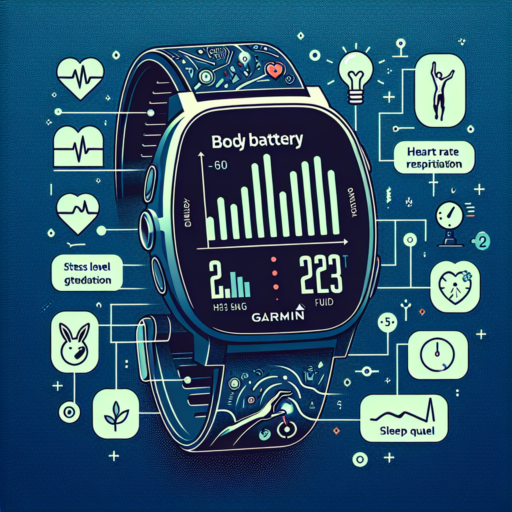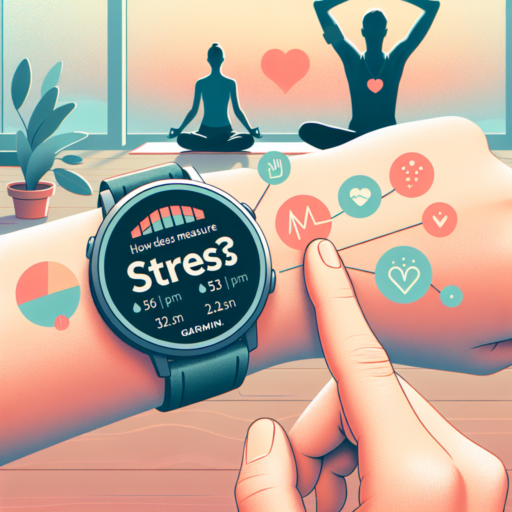What is Garmin’s Body Battery Feature?
Garmin’s Body Battery feature is a health-monitoring function that offers a deep insight into your body’s energy levels throughout the day. It uses a combination of data from heart rate variability (HRV), stress, sleep quality, and physical activity to compute and present your energy reserves from a score of 1 to 100. Understanding these numbers can significantly aid in managing your daily activities, ensuring you’re not overexerting yourself and finding the perfect balance for recovery and productivity.
How Does It Function? At its core, the Garmin Body Battery synthesizes complex physiological metrics to give you an effortless interpretation of your current state. When your Body Battery score is high, you’re assumed to be fully charged and ready to tackle intensive tasks. Conversely, a lower score suggests it’s time to unwind and allow your body to recover. This smart feature adapys dynamically throughout the day based on your activity level and rest periods, essentially guiding you on when to push forward and when to pull back.
Particularly useful for athletes, fitness enthusiasts, and even busy professionals, Garmin’s Body Battery can serve as a gauge for your daily readiness. By monitoring fluctuations in your energy levels, it can help you make informed decisions about your fitness routines, work schedules, and rest times. Balancing your energy expenditure with adequate recovery is crucial for long-term wellness, and this feature provides the insights needed to achieve that equilibrium.
How Garmin Body Battery Works and Measures Energy Levels
Understanding the functionality of Garmin’s Body Battery feature helps users optimize their energy throughout the day. This feature, based on a combination of heart rate variability (HRV), stress, and activity data, offers a unique insight into your current energy reserves. It effectively quantifies your energy levels on a scale from 1 to 100, providing a clear representation of how ready you are to tackle physical or mental stressors.
Monitoring Heart Rate Variability (HRV)
At its core, the Garmin Body Battery technology hinges on the measurement of Heart Rate Variability (HRV). HRV refers to the time variation between each heartbeat, and it’s a critical indicator of your body’s stress levels and recovery status. A higher HRV suggests a relaxed, rested state, thus indicating a higher Body Battery score, while a lower HRV, indicative of stress or fatigue, results in a lower score. By monitoring your HRV, the Garmin device provides a real-time assessment of your energy levels, enabling you to plan your day more effectively.
Assessing Stress and Activity Impact
In addition to HRV, the Garmin Body Battery also takes into account your stress levels and physical activity to determine your energy levels. It factors in the intensity and duration of your activities, distinguishing between those that deplete your energy and those that help you recharge. For instance, vigorous exercise will reduce your Body Battery level, while rest and minor activities might help restore it. This comprehensive approach ensures that the energy level displayed on your Garmin device reflects your body’s true condition.
By continuously tracking these critical metrics, the Garmin Body Battery offers insights into the best times for activity and rest, empowering you to make informed decisions about your health and daily routines.
The Science Behind Measuring Body Battery with Garmin Devices
Garmin devices have revolutionized the way we understand and monitor our physical well-being through an innovative feature known as the Body Battery. This technology measures the body’s energy levels by analyzing a combination of physiological markers. These markers include stress levels, heart rate variability (HRV), sleep quality, and activity data. By synthesizing this data, Garmin devices provide a comprehensive snapshot of one’s energy reserves, enabling users to make informed decisions about their daily activities and rest periods.
The foundation of the Body Battery lies in its ability to measure heart rate variability (HRV). HRV is the variation in time between each heartbeat, and it’s a critical indicator of the autonomic nervous system’s activity. The autonomic nervous system regulates vital functions such as heart rate, digestion, and respiratory rate, and it operates on two modes: sympathetic («fight or flight») and parasympathetic («rest and digest»). Garmin devices assess HRV during periods of inactivity to determine your body’s recovery status and readiness to perform.
Additionally, Garmin’s algorithm incorporates data on stress levels and physical activity to offer a rounded view of the user’s energy dynamics. Stress measurements are taken throughout the day, providing insight into how psychological and physical stressors are depleting the Body Battery. Meanwhile, recorded physical activity levels help understand energy output, making the estimation of recharge rates and depletion more accurate. Ultimately, by analyzing these diverse wellness metrics, Garmin devices can effectively guide users towards optimizing their energy levels and improving overall health.
Understanding Your Body Battery Score: What Does It Mean?
Your Body Battery score is a vital metric available on various smart wearables and health apps today. It’s designed to help you gauge your body’s current energy level, drawing from an analysis of your sleep patterns, stress levels, and physical activity. Simply put, it offers a numerical representation, usually on a scale from 0 to 100, of how charged or depleted your energy reserves are at any given moment. Understanding this score can be crucial for managing your daily activities and wellness regimen effectively.
The mechanism behind calculating your Body Battery score involves a combination of heart rate variability (HRV), stress levels, and physical activity data. HRV, in particular, is a key indicator of how your body balances stress and recovery phases. When your HRV indicates a higher level of variability, it suggests that your body is well-rested and capable of handling stress efficiently, which contributes to a higher Body Battery score. Conversely, lower variability indicates stress or physical exertion, leading to a lower score. By keeping an eye on these changes, you can better understand your body’s recovery needs and overall energy availability.
However, it’s essential to recognize that everyone’s optimal Body Battery score might differ. While waking up with a score close to 100 is ideal, indicating a full recovery and readiness for the day, fluctuations throughout the day are normal. Activities such as exercise, work-related stress, or poor sleep can drain your battery, reflected in a lower score. Paying attention to how certain habits and activities impact your score can guide you in making lifestyle adjustments for improved health and well-being. Tracking these variations helps you to identify patterns and make informed decisions about rest, activity, and stress management.
Improving Your Body Battery Score: Tips and Strategies
The concept of a «body battery» has garnered immense popularity among fitness enthusiasts and health-conscious individuals. Essentially, it’s a metaphorical representation of your energy levels, quantified by various fitness trackers and health apps. Improving your body battery score not only boosts your physical vitality but also enhances your overall well-being. Implementing specific lifestyle changes and adopting new health strategies can play a pivotal role in this enhancement. Here, we delve into some of the most effective tips and strategies to help uplift your body battery score.
Optimize Your Sleep Quality
One of the cornerstone practices for improving your body battery score is optimizing sleep quality. A restorative night’s sleep can recharge your body battery efficiently, making it imperative to establish a conducive sleep environment and a consistent bedtime routine. Avoiding screens before bedtime, limiting caffeine intake in the afternoon, and ensuring your bedroom is cool and dark can significantly enhance your sleep quality, thereby improving your body battery score.
Nutritional Interventions
What you fuel your body with profoundly impacts your body battery score. Emphasizing a balanced diet rich in whole foods, such as fruits, vegetables, lean proteins, and healthy fats, provides your body with the necessary nutrients to function optimally. Hydration is another critical aspect; consuming ample fluids throughout the day supports bodily functions and contributes to a higher body battery score. Introducing regular, nutritious meals and snacks into your daily routine can offer sustained energy, preventing significant dips in your body battery level.
Incorporate Mindful Movement
Physical activity is instrumental in enhancing your body battery score, but it’s equally important to engage in mindful movement. Integrating activities such as yoga, Pilates, or even short walking breaks into your daily routine can improve your energy levels without depleting your body battery. It’s essential to listen to your body and balance high-intensity workouts with more restorative forms of exercise to prevent overexertion, which can counterintuitively lower your body battery score.
No se han encontrado productos.
Comparing Garmin Body Battery to Other Fitness Metrics
When it comes to tracking fitness and health metrics, Garmin’s Body Battery feature stands out for its innovative approach. This unique metric, available on various Garmin devices, aims to provide a comprehensive overview of your energy levels by analyzing rest, activity, and stress. Unlike traditional fitness metrics that often focus solely on physical activity, the Body Battery combines data from multiple sources to offer a holistic view of your well-being.
Stress and recovery play crucial roles in how the Garmin Body Battery differentiates itself from other fitness metrics. Traditional metrics such as steps taken, calories burned, and heart rate provide valuable insights into physical activity and exertion. However, they might not fully account for how stress and rest impact your energy levels throughout the day. By incorporating these elements, the Body Battery gives a fuller picture of your energy reserves, helping you make informed decisions about when to push your limits and when to take a breather.
Moreover, the integration of sleep quality assessments further sets the Body Battery apart. Good sleep is foundational to effective recovery and overall health. While most fitness trackers monitor sleep, the Body Battery takes this a step further by analyzing sleep patterns alongside stress and activity data to estimate how much they replenish or deplete your energy. This holistic approach to health tracking encourages a more balanced lifestyle, emphasizing the importance of rest and recovery in addition to physical activity.
How to Use Garmin’s Body Battery to Enhance Your Wellness Routine
Garmin’s Body Battery feature is a revolutionary tool designed to provide users with intricate details about their body’s energy levels. Understanding and leveraging this information can significantly improve your wellness routine, helping you make informed decisions about your daily activities and exercise. By monitoring your Body Battery score, you gain insights into when to push forward with your wellness activities and when to take a step back and relax.
Tracking Your Daily Energy Levels
Begin by consistently tracking your energy levels through the Garmin Connect app. This feature calculates your Body Battery based on various metrics such as heart rate variability (HRV), stress levels, and sleep quality. Pay attention to the fluctuations in your score to identify patterns indicating your peak activity times. This data facilitates a structured wellness routine, where activities are aligned with your body’s natural energy cycles, enhancing efficacy and reducing fatigue.
Integrating Rest and Recovery
A critical aspect of utilizing the Body Battery feature for wellness is acknowledging the importance of rest and recovery. When your Body Battery score is low, it signifies that your body needs to recharge. Respect this signal by incorporating relaxation techniques such as meditation, yoga, or even short naps into your routine. Balancing activity with adequate rest not only prevents burnout but also ensures that you’re at your best, energy-wise, for your next workout or task.
Common Questions About Garmin Body Battery Explained
Many Garmin device users are intrigued by the innovative feature known as the Body Battery. This component offers a glimpse into your personal energy levels, assisting in managing your daily activities and workouts. As with any sophisticated piece of technology, questions often arise about how it functions and benefits users. To demystify some of these inquiries, we delve into common questions surrounding the Garmin Body Battery.
How Does Garmin Body Battery Calculate Energy Levels?
At the core of the Garmin Body Battery’s functionality is a combination of heart rate variability (HRV), stress, and activity data to gauge your energy reserves. This tool intricately analyses these data points to provide a numeric representation of your current energy level. By tracking these metrics over time, the Body Battery can give insights on the best times for activity and rest.
Can the Body Battery Predict Illness?
While the Garmin Body Battery is not designed to diagnose or predict illnesses, a significant decrease in energy levels as indicated by the Body Battery could be a signal of stress or the onset of sickness. It’s a tool that empowers users to listen to their bodies by observing patterns and making adjustments to activities and rest accordingly.
Understanding the functionalities and benefits of the Garmin Body Battery can significantly enhance your approach to health and fitness. By paying attention to the data provided, users can make informed decisions about when to push forward and when to rest, leading to improved overall well-being.
Garmin Body Battery: Real User Experiences and Reviews
When it comes to tracking and improving your physical and mental health, the Garmin Body Battery feature stands out as a revolutionary tool. By monitoring energy levels and offering insights into when to push hard or take it easy, Garmin devices have attracted a diverse audience keen on elevating their wellness routine. This insight looks into real user experiences and reviews to shed light on how effective the Garmin Body Battery can be in everyday life.
Understanding User Feedback
Most users who’ve shared their experiences online highlight the Garmin Body Battery as a game-changer in managing their daily activities. They appreciate how it integrates data on stress, heart rate variability (HRV), sleep, and activity to provide a comprehensive energy score. This score then guides them in making informed decisions about their physical activities and rest periods. Interestingly, a number of users have noted significant improvements in their overall well-being, attributing it to the fine-tuning of their lifestyle based on the feedback provided by their Garmin device.
Navigating the Downsides
However, it’s pivotal to acknowledge that not all feedback is overwhelmingly positive. Some users have expressed concerns over the accuracy of the data, particularly during periods of high stress or irregular sleep patterns. These instances, though relatively few, highlight the importance of continuous software updates and the potential need for users to manually adjust their expectations and usage of the device based on their unique lifestyle and health conditions.
In conclusion, the majority of Garmin users find the Body Battery feature a valuable addition to their health and fitness arsenal, with many citing it as a crucial motivator in their journey towards better health. The few critiques point towards areas for Garmin to evolve, ensuring that the Body Battery remains a reliable source of personal energy insights for a wide range of users.
Future Developments in Garmin’s Body Battery Technology
Garmin’s Body Battery technology, a vital component of their health and wellness ecosystem, is expected to see significant advancements in the near future. This innovative feature, which provides users with insights into their personal energy levels, is set to become even more intuitive and integral to daily health management. As Garmin relentlessly pursains enhancements in wearable technology, the Body Battery feature stands out for its potential to transform personal health monitoring.
The focus on leveraging AI and machine learning stands at the forefront of expected developments. The aim is to enable the Body Battery technology to deliver more personalized and accurate energy level readings. By analyzing a more comprehensive set of data points, including stress levels, sleep quality, and physical activity, the technology will offer tailored recommendations to help users optimize their daily schedules for better health and energy management.
Integration with other health platforms and services is another exciting dimension of Garmin’s roadmap for the Body Battery feature. Garmin plans to enhance the utility and versatility of the Body Battery by allowing it to communicate seamlessly with a wider array of health and fitness apps. This interoperability will empower users to have a more holistic view of their health, making the Body Battery an indispensable tool for anyone looking to take control of their wellness journey.




